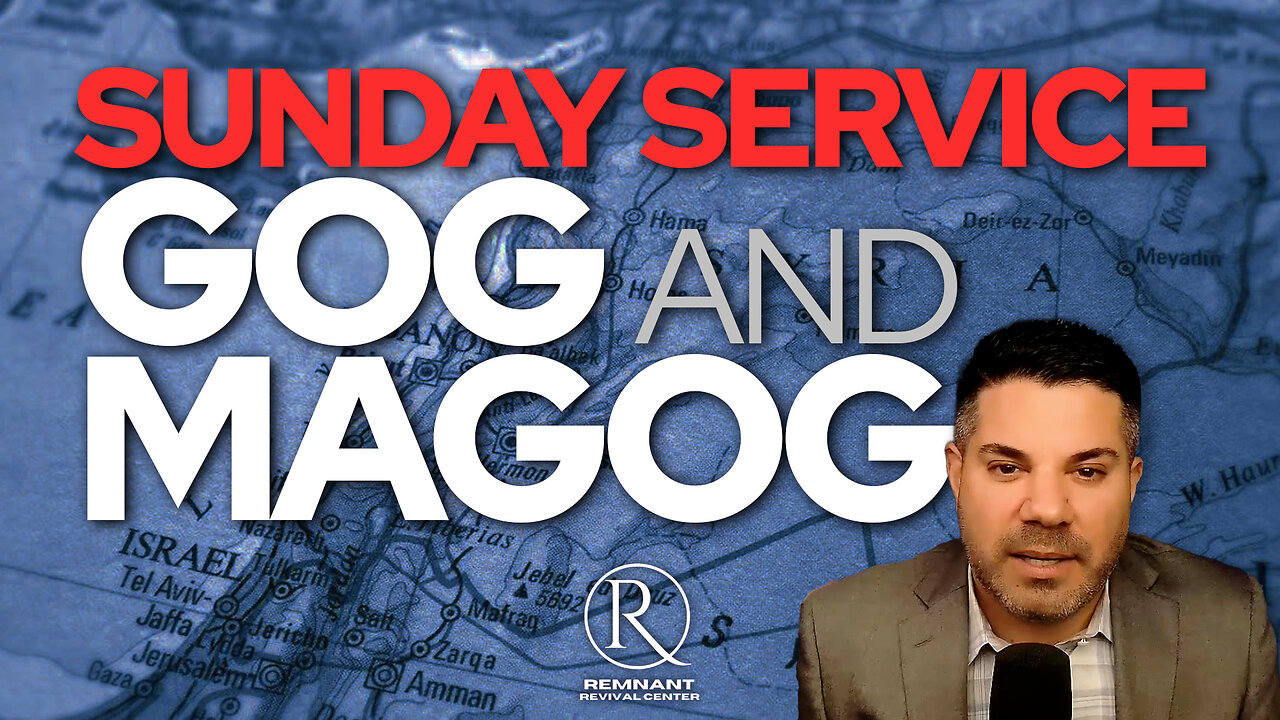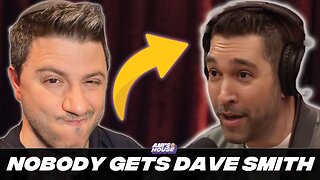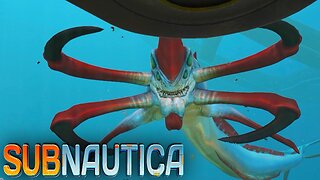Premium Only Content

🙏 Sunday Service • "Gog and Magog" 🙏
🙏 Sunday Service • "Gog and Magog" 🙏
👉 To Give: www.ToddCoconato.com/give
👉 New Book: www.PastorToddBook.com
👉 Website: www.PastorTodd.org
👉 Church website: www.RRCNashville.org
Gog and Magog in the Bible
In the book of Ezekiel, chapter 39:1-3 (NKJV), the Lord God of Israel declares directly to the leader of the invading masses, “I am against you, O Gog, the prince of Rosh, Meshech and Tubal,” and then He says “I will turn you back, drive you on, and take you up the north parts and bring you against the mountains of Israel … you and all your troops and the peoples who are with you.” Some seem to believe this could refer to modern Day Russia as well as a few of her allies.
This large, invading force, the totality of their defeat and the vast cemetery for the invaders, will become a great testimony to the glory of Israel’s God (v. 13).
This huge burial place will become known as the Valley of Hamon Gog (the hordes of Gog) and is noted in verse 11 as being “east of the sea.”
In Pastor Jack Hayford’s footnote commentary for this chapter in the Spirit-Filled Life Bible, he identifies three ways interpreters have explained this invasion and drastic turn of events.
He says some interpret this as…
No. 1. an end-times battle fought with ancient weapons, which are then literally burned;
No. 2. using ancient imagery to describe a future battle, which would use modern weaponry of the times; or
No. 3. symbolically portraying the dynamics of spiritual warfare.
Most scholars feel that according to Ezekiel’s prophecy, Gog will be the leader of a great army that attacks the land of Israel, which is “peaceful and unsuspecting” at the time (Ezekiel 38:11). Gog is described as “of the land of Magog, the prince of Rosh, Meshech, and Tubal” (Ezekiel 38:2–3).
When will Ezekiel’s battle of Gog and Magog occur?
There are a couple of theories…
• Before the tribulation begins. This view points to the fact that, after the battle, the people of Israel will
According to Ezekiel, Magog will not win. God will intervene to preserve Israel. “There shall be a great earthquake” (Ezekiel 38:19), “every man’s sword will be against his brother” (verse 21), and God “will pour down torrents of rain, hailstones and burning sulfur on [Gog] and on his troops and on the many nations with him” (verse 22). The result is that the nations will see God’s greatness and holiness (verse 23).
Whatever your viewpoint, Ezekiel 39 explains that following the dramatic conclusion to this failed invasion of tiny Israel and the seven-month-burial process of the invaders there will be a seven-year “clean-up” operation (vv. 11-16), where Israel will “cleanse the land” by burning the weapons which fell from the hands of the vast allied armies (v. 9).
Historically speaking, Magog was a grandson of Noah (Genesis 10:2). The descendants of Magog settled to the far north of Israel, likely in Europe and northern Asia (Ezekiel 38:2). Magog seems to be used to refer to "northern barbarians" in general, but likely also has a connection to Magog the person. The people of Magog are described as skilled warriors (Ezekiel 38:15; 39:3-9).
Gog and Magog appear in Ezekiel 38—39 and in Revelation 20:7–8. While these two passages use the same names, a close study of Scripture clearly demonstrates they do not refer to the same people and events. The events are separated by at least 1,000 years. In Ezekiel’s prophecy, Gog will be the leader of a great army that attacks the land of Israel, which is “peaceful and unsuspecting” at the time (Ezekiel 38:11). Gog is described as “of the land of Magog, the prince of Rosh, Meshech, and Tubal” (Ezekiel 38:2–3). When will Ezekiel’s battle of Gog and Magog occur? There are a couple of theories:
• Before the tribulation begins. This view points to the fact that, after the battle, the people of Israel will be burning the enemy’s weapons for seven years and spend over seven months burying the dead (Ezekiel 39:9–10, 12–16). That length of time most likely requires the battle to be fought before the tribulation, and possibly even before the rapture of the church.
• During the first part of the seven-year tribulation. This view hinges on the fact that Israel is at peace when the attack begins (Ezekiel 38:8, 11). The security Israel enjoys is assumed to be the result of Israel’s covenant with the Antichrist at the beginning of the tribulation, Daniel’s 70th Week (Daniel 9:27a).
The book of Revelation uses Ezekiel’s prophecy about Magog to portray a final end-times attack on the nation of Israel (Revelation 20:8-9). The result of this battle is that all are destroyed, and Satan will find his final place in the lake of fire (Revelation 20:10).
It is important to recognize that the Gog and Magog of Ezekiel 38-39 is quite different from the one in Revelation 20:7-8. Below are some of the more obvious reasons why these refer to different people and battles.
1. In the battle of Ezekiel 38-39, the armies come primarily from the north and involve only a few nations of the earth (Ezekiel 38:6, 15; 39:2). The battle in Revelation 20:7-9 will involve all nations, so armies will come from all directions, not just from the north.
2. There is no mention of Satan in the context of Ezekiel 38-39. In Revelation 20:7 the context clearly places the battle at the end of the millennium with Satan as the primary character.
3. Ezekiel 39:11–12 states that the dead will be buried for seven months. There would be no need to bury the dead if the battle in Ezekiel 38—39 is the one described in Revelation 20:8–9, for immediately following Revelation 20:8–9 is the Great White Throne judgment (20:11–15) and then the present heaven and earth are destroyed, replaced by a new heaven and earth (Revelation 21:1). There obviously will be a need to bury the dead if the battle takes place before or in the early part of the tribulation, for the land of Israel will be occupied for another 1,000 years, the length of the millennial kingdom (Revelation 20:4–6).
4. The battle in Ezekiel 38-39 is used by God to bring Israel back to Him (Ezekiel 39:21-29). In Revelation 20, Israel has been faithful to God for 1,000 years (the millennial kingdom). Those in Revelation 20:7-10 who are rebellious are destroyed without any more opportunity for repentance.
With Russia back in the news in a big way, many people are wondering if recent events in eastern Europe have anything to do with end-times prophecy—and, if so, how? Much of the discussion has to do with an ancient prophecy from Ezekiel: “The word of the Lord came to me: ‘Son of man, set your face against Gog, of the land of Magog, the chief prince of Meshek and Tubal; prophesy against him and say: “This is what the Sovereign Lord says: I am against you, Gog, chief prince of Meshek and Tubal”’” (Ezekiel 38:1–3). The identities of “Gog,” “Magog,” “Meshek,” and “Tubal” are the key to fully understanding the prophecy.
Gog is a person. Whoever Gog is, he is from the land of Magog and is the leader of Tubal and Meshek (some translations add “Rosh” to the list) and a confederacy of other nations: Persia, Cush, Put, Gomer, and Beth Togarmah (Ezekiel 38:5–6). And, whoever he is, he will have plans to “attack a peaceful and unsuspecting people,” viz., Israel (verses 11, 14, and 18). But, regardless of Gog’s plans, the Lord God is against him and will defeat him soundly (Ezekiel 38:4, 19–23; 39:3–5).
Magog is a land “in the far north,” from Israel’s point of view (Ezekiel 38:15; 39:2). Most Bible commentators interpret “Magog” as Russia—and, indeed, Russia is straight north of Israel, all the way up to the Arctic Circle. According to this view, “Rosh” is a reference to Russia, “Meshek” is either Moscow or the people north of the Black Sea (the area of southern Russia and Ukraine), and “Tubal,” which is always listed with Meshek in Scripture, is identified as a city in Siberia or an area in central Turkey.
Others see “Magog” as a general term used in Ezekiel’s day to identify barbarians living near the Black and Caspian Seas. Regardless of the exact locations of Magog, Tubal, and Meshek, there is no doubt that the general area includes portions of Russia and the former Soviet Union, and possibly some Arab countries.
So, yes, the Bible does mention Russia, although not by that name, in connection with the end times. Ezekiel 38—39 definitely refer to a nation coming from northern Asia to attack Israel. After the Cold War, Russia lost its superpower status, making the fulfillment of Ezekiel’s prophecy seem unlikely in some people’s eyes. However, recent events have shown that Russia is gaining strength, and many believe that the invasion of Ukraine is just a first step in Russia’s plan to restore its dominance in that hemisphere. It is also interesting to note that, in the Soviet era, Moscow was solidly aligned with several Muslim countries in opposition to Israel. Since the breakup of the Soviet Union, Russia has continued to make overtures to the Muslim world.
According to the Bible, there will come a time when Russia, in alliance with several other countries, will amass a huge army against Israel, with a view to plunder the Jews’ land. The nations aligned with Russia for this military endeavor are Persia (modern-day Iran), Put (modern-day Libya), Cush (modern-day Sudan), Gomer (part of modern-day Turkey), and Beth Togarmah (Armenia). Most of these nations are currently militant Islamic states with an express hatred of Israel. Ezekiel says that, when the aggressors move against Israel, a few other nations (“Sheba and Dedan and the merchants of Tarshish”) will remonstrate, as will “all her villages”—possibly colonies (Ezekiel 38:13). Sheba and Dedan are associated with areas of northern Africa. Tarshish could be a reference to Spain (which colonized much of South America), Britain (which colonized the United States), or somewhere in eastern Africa. The objections to Magog’s aggression will fall on deaf ears, however, and the invasion will continue.
Some commentators believe this war is one of the events leading up to beginning of the tribulation. Others believe it will occur close to the midpoint of the tribulation, since Israel will be “dwelling without walls, and having neither bars nor gates” (Ezekiel 38:11)—in other words, Israel will feel secure at that time, possibly because of the covenant they have signed with the Antichrist (Daniel 9:27). Either way, this battle is distinct from the Battle of Armageddon, which occurs at the end of the tribulation.
God promises to destroy Gog’s army: “I will execute judgment on him with plague and bloodshed; I will pour down torrents of rain, hailstones and burning sulfur on him and on his troops and on the many nations with him” (Ezekiel 38:22). The bodies of the fallen army of Magog will be buried, but it will take over seven months to complete the macabre task (Ezekiel 39:12, 14). This supernatural judgment will have the effect of preserving Israel and turning many hearts to God: “And so I will show my greatness and my holiness, and I will make myself known in the sight of many nations. Then they will know that I am the Lord” (Ezekiel 38:23). Many will be saved during the tribulation (Revelation 7), and the fulfillment of Ezekiel 38—39 will be one means by which God will bring people to a knowledge of Himself.
There is much we do not know for certain about Ezekiel’s prophecy, including the timing of these events. However, it is clear that Russia will be involved and will in fact lead an end-times league of nations to seize Israel’s land. The prophet Ezekiel comforts Israel in much the same way as Moses had centuries ago: “The LORD your God is the one who goes with you to fight for you against your enemies to give you victory” (Deuteronomy 20:4).
-
 27:34
27:34
Todd Coconato Show
2 days agoWill I Ever Be Christian Enough? • The Todd Coconato Radio Show
5631 -
 32:30
32:30
Stephen Gardner
9 hours ago🚨BREAKING: Trump under INVESTIGATION for Stock Market Manipulation!
69.8K160 -
 59:50
59:50
Motherland Casino
6 hours agoMel x Zofie
34.4K5 -
 44:54
44:54
Ami's House
2 days agoThe Dave Smith Debate is Broken. Here's a Better Way In | Dave's Rogan Appearance
61.7K11 -
 3:47:20
3:47:20
SlingerGames
8 hours agoDiving (get it?) Back Into Subnautica!
35.5K1 -
 58:35
58:35
BonginoReport
12 hours agoFormer Trans Athlete Accepts Biological Reality - Nightly Scroll w/Hayley Caronia (Ep.24) - 04/10/25
160K100 -
 2:48:38
2:48:38
The Sufari Hub
7 hours ago🔴NOT ENDING STREAM TILL I WIN - ROAD TO #1 GAMER ON RUMBLE - #RumbleGaming
16.3K1 -
 1:49:21
1:49:21
Joker Effect
8 hours ago250$$ Giveaway! MOTHERLAND TAKEOVER!
29.2K -
![🔴 MAFIA III [first look]](https://1a-1791.com/video/fww1/21/s8/1/V/_/U/A/V_UAy.0kob-small--MAFIA-III-first-look.jpg) 3:01:30
3:01:30
Fragniac
1 day ago🔴 MAFIA III [first look]
18K2 -
 2:06:26
2:06:26
megimu32
10 hours agoON THE SUBJECT: Movies We Had Zero Business Watching.. But Totally Did!
30.9K2